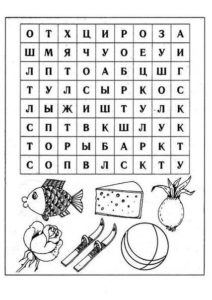primary-schooler
MBOU of the Polevsky urban district "SOSH No. 21"
Intellectual game in Russian for 2nd class
"Playing with words and words"
Everything is named
And the beast and the object,
Everything around me is full.
There are no names!
And all that the eye can see,
Above us and below us--
And everything in our memory.
Denoted by words
Host:Today's game is dedicated to the native Russian language. Why do you think you need to know him?
- Russian is the most beautiful, richest language in the world. Learning the secrets of the Russian language, you become smarter, kinder, wiser. Knowing him, you can read many interesting, smart books, become an educated person.
- How many of you know how the speech came about?
- For a long time, people could not talk, although they had everything for it.
- It's amazing, isn't it?
- Even birds and various other creatures, when they were born, could speak in their own way. But it's different for humans. A newly born child cannot speak, every child must be taught this.
- But who taught the very first children when the adults themselves could not speak?
- No one knows for sure, but it is speculated that 25,000 years ago, humans learned to talk because they needed to communicate and depended on each other. We must also love and cherish our native language. Russian language experts are here today. Towards the discovery of the secrets of the Russian language.
“We are given possession of the richest, most accurate and truly magical.Russian
K. paustov
Phonetics
He can be quiet, loud,
And the deaf and the caller.
It might be a quick one.
If he wants to, he will live.
As long as the call
He won't get time.
He always trembles everywhere.
And running through the air
His mouth is like his home,
It's like a wave.
He likes to echo,
Bury in the drum.
If you hear a knock,
So we got here... (sound)
1. Read the poem. Then you hear the sound of the sound of the sound.
Write in the square how many words you found.
- I know a walrus.
He eats porridge, drinks borge,
He loves the Eskimo.
We go to the movies together.
He's alone among the walruses.
I haven't seen the big ice floes.
He didn't even see the sea.
This walrus is Borya's carrot,
He's an athlete, my buddy.
He swims in the winter.
Who is the poem talking about?
D.The boy.
Ugh.What does the author of the poem call it?
D.Walrus.
Ugh.Who's a walrus?
Children answer. The teacher writes down on the blackboard an explanation of the meaning of the word.
The walrus is a northern animal.
A walrus is a person who is not afraid of cold, tempered, bathes in winter.
- What can you say about that word?
D.It's ambiguous.
orthoepy
Orthoepia song
Not knowing the orthoepy
In all its splendor.
You won't feel her magic.
Life seems like a nightmare.
When one stroke
Not what's needed is put at risk.
I didn't.ОferryЁр
No.АporcelainОp.
It wasn't announced.Иword--
Trial trialsОp.
The chauffeur left for many
No.ЕyearsА,
And the door isn't behind him.Аperch
Was, but locked.А.
2. Memories.
- Very often children and even adults incorrectly allocate the percussion syllable.
The word is pronounced funny. But it is very important to pronounce the words correctly In this we will help verses-memories: Shall we play?
Helps us read.
Teaches letters to distinguish,
He's famous, famous.
We all need it... Alphabet!
This stone is very strong.
And pretty enough.
Beat him all day.
It won't split...silicon.
They cut down the spruce.
They ripped off ... sorrel!
My unknown neighbor is moaning,
His phone doesn't ring.
The stealth machine is silent--
Waiting for someone to call!
- Here's your next assignment. Read poems and in the highlighted word, put emphasis.
Not wearing shorts,
It took a long time to eat cakes!
Our grandmother Fökla
Red as beets!
Like our Martha.
Everybody in the scarf!
Paints the walls for us painter
Shelves make a carpenter.
He's the boss.
He'll sign ... the document.
Morphology
Noun --school
Wakes up.- verb,
With an adjective.cheerful,
New school day's here!
3. Kiwi's grandmother asked her grandson to invite her friends to her birthday party. She gave him her notebook. My grandmother recorded contacts without glasses. Because of this, the letters in the words are confused.Help your grandson findThe names of Grandma's girlfriends. Round the letters of the selected answers.

Punctuation
A branch of language science that studies punctuation marks and the rules for putting them. Worthy of attention - punctuation marks
The question mark is the coolest!
To me, he's the most beautiful.
I've known him since childhood.
Why me and him?
4. Arrange the punctuation marks like this.
The meaning of the sentence is correct:
He has twenty-five fingers on each hand, ten on his feet.
syntax
Section of the Russian language, studying the sentence and phrases.
Poká Šakal was scouring, wolves howling at the moon.
Aren't these miracles?!
5. Here are some of the things she saw when she came to the kitchen. Look inside the sentences.
- Inna tried to wake Jeanne,GAnna was fast asleep.
- grillepitchRope.
- Oh, no problem.glassThat man!
- At first we argued for a long time, and then we began to saycapf move.
- utea, Nick.Fuck!
Lexicon.
A branch of language science that studies the meaning of words, multi-valued words, synonyms, antonyms, obsolete words, etc.
Read a couple of phrases.
Color those of them,
where words are used in a figurative sense.
Baby's head, onion head
A ripe apple is an eyeball.
The fox tail is the tail of the train
Fashionable mushroom hat
Golden hands are golden earrings
Secret.
Etymology- the origin of words.
Read the origin history of some dictionary words.
Glove.from the Slavic language: from the wordfinger- finger.
Brown.- from the Slavic language: bark colorscrookedwood.
Pencil- from Turkic:"kura"- black,"dash"- A stone.
Football- from English: “foot- leg,ball- ball.
Bicycle- from Latin:bicycle“Fast, pedal, leg.”
astronomer- from Greek: “straight- The star,numberThe law.
Candy- from Italian: “sugar-boiled?
Compare information about the etymology (origin) of Slavic words with the etymology of words of other languages.
1) Answer the question: why are there so many words in the Russian language that need to be specified in the dictionary?
2) You can guess a few more words (and write them right) by their origin. Select the unstressed sound, which is usually specified by the dictionary.
| Word | Origin |
| trap | from the Turkic language: from “cap” – to grab, literally – “trap” |
| scribble | from the Turkic language: fromkaraIt's black.pitcher- Hand.bad-hand- Bad handwriting. |
| general | from German and French: fromGeneral Captain.Chief Commander |
| carousel | from French:carol- dance,villageSaddle - dance in the saddle (on horse) |
| tomato | from Italian:Come on.- gold,doro- apple |
Got a pin.head!
But no hair, alas!
The kettle has a nose, but no head!
There.earThe needle, but it can't hear!
There.tongueI have shoes, but the shoes are silent!
Got some on the road.holes,But no chin and no cheeks.
There's a mountain.footBut you can't see.leg!
There's a mountaineer.brushes,But the poor thing has no hands!
White.glarePotatoes, not looking around!
Key keyIt is more likely that there is no lock.
In the field, with no legs, lazyfleeriver!
Got a comb.teethBut she can't eat!
Over a month.monthThe moon passes, not the moon.
There.sleevethe stream, though the stream is not clothed,
The folder is under the armpit, but not under the cat!
(V. Lunin)
"The Literatures."
Our motto:
We work and we fuss.
Rotating like a merry-go-round.
And we help with everything.
We're called literate.
Our motto: Do not be discouraged, see everything, find out everything.
{module Yandex}




